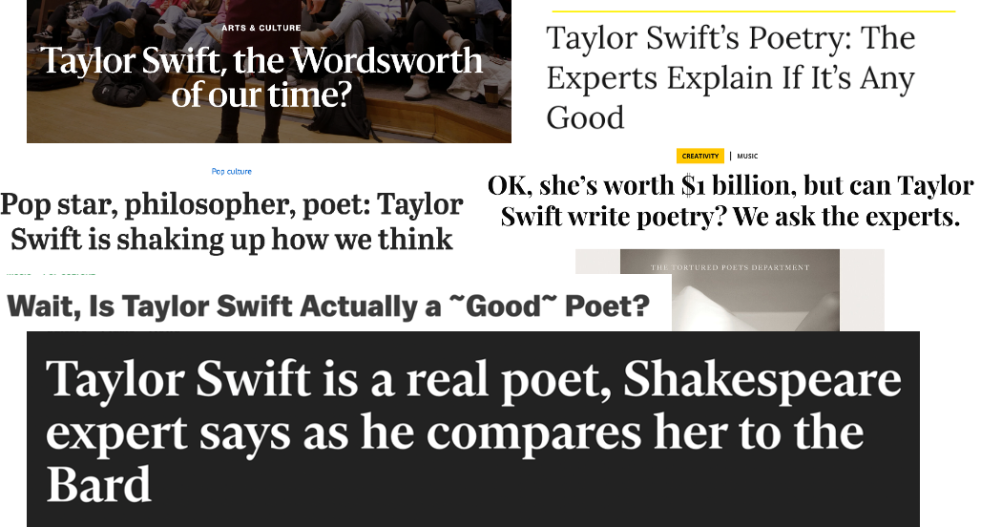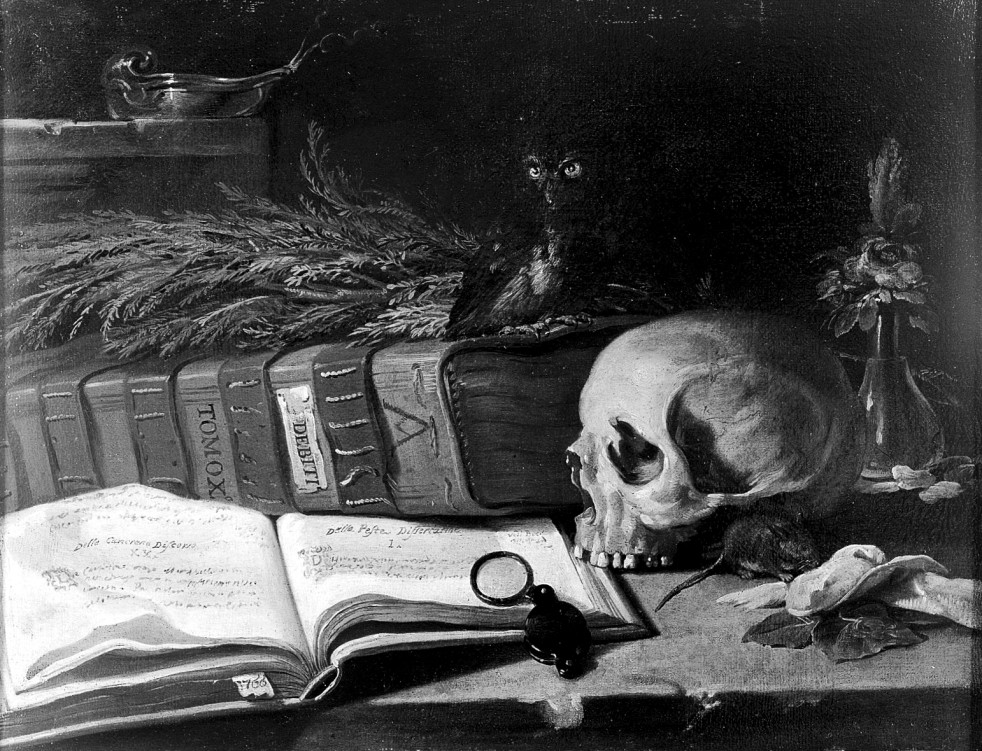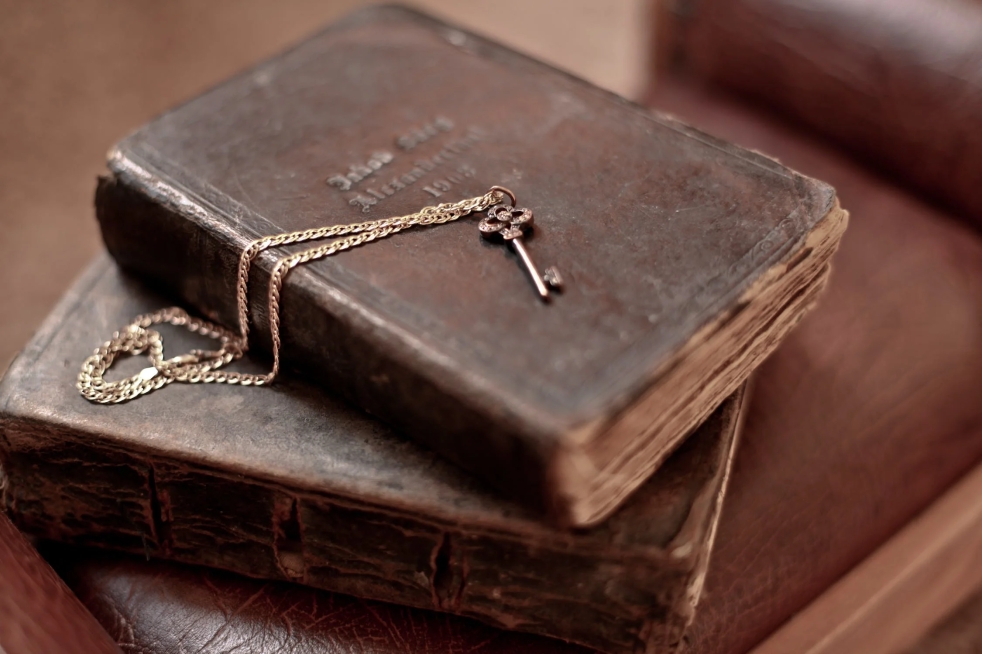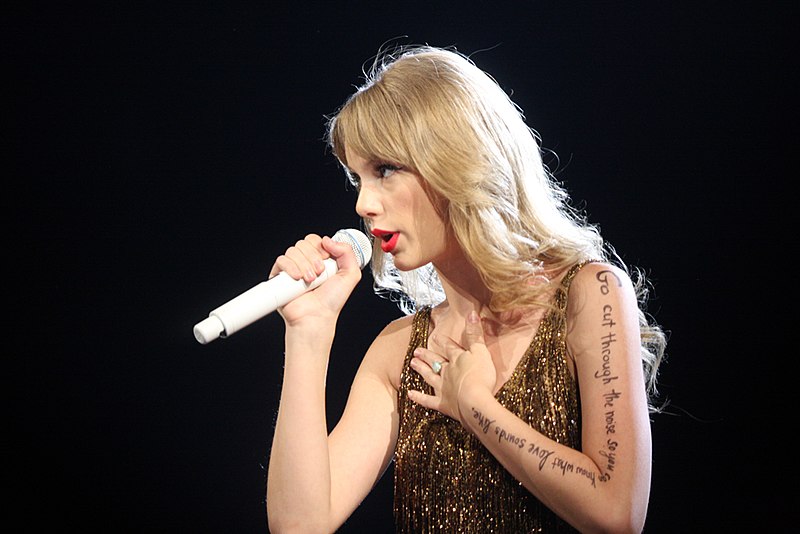Now that the glitter has settled on The Life of a Showgirl’s release, and I’ve spent enough time on Reddit fan forums and the comments section of Instagram to feel that I’ve gained both a comprehensive overview of audience reactions and a deep, visceral need to go outside and touch some grass, I wanted to… Continue reading Is it ‘Actually Romantic’ to renounce one’s feminism?
Tag: media
Swifterature: the book. Coming 4 November
You can find countless articles online – and a few books by now, too – listing all the literary allusions in Taylor Swift’s work, many of which I've also documented on this blog. Beyond suggesting that Swift is familiar with some English literary classics, though, these lists don’t really tell us much at all. When… Continue reading Swifterature: the book. Coming 4 November
The Taylor Seminars: ‘Chloe or Sam or Sophia or Marcus’
This week, I joined Hannah Chao and Exquisite Williams on their fantastic podcast, The Taylor Seminars. Each week, Hannah and Exquisite do a deep dive into a Taylor track, looking at the lyrics in forensic detail. Since I also run Taylor seminars, of a slightly different sort, this was a perfect match! Hannah and Exquisite… Continue reading The Taylor Seminars: ‘Chloe or Sam or Sophia or Marcus’
Coming Soon: My First Taylor Swift Book!
Straight from the tortured poets department, I am absolutely ecstatic to announce something out of my Wildest Dreams: my first TAYLOR SWIFT BOOK will be published in January! It's a collection of 46 songs - from Debut to TTPD - with annotated lyrics and accompanying literary analysis, taking a super deep dive into the poetic… Continue reading Coming Soon: My First Taylor Swift Book!
Is Taylor Swift a poet? Yes. Is that the wrong question to ask? Also yes
With less than 24 hours to go before perhaps the biggest release in music history - Taylor Swift's hotly-anticipated eleventh album, The Tortured Poets Department, already downloaded over 200 million times after being leaked the day before the official launch - the requests have started to roll into my inbox from journalists, all asking a variation on the same question: does this mean that Taylor Swift is, like...a poet? An actual...poet? [Click above image to read more]
Speak now? Aviation, activism and accountability
The other day, I received an email. It went straight into the special folder of my inbox where any emails containing the keyword ‘Swift’ are automatically programmed to go; this is my desperate attempt to try and maintain some compartmentalisation of my professional life, since I do actually also have to maintain a normal full-time workload on top of repeatedly telling the media why All Too Well (10 minute version) is a masterpiece (which, don’t get me wrong, I love to do, because it is).
Baited hooks and silly books: why Taylor Swift is the new Gothic novel
‘Too many young women yearn for annihilation’, reads the clickbaity subtitle of Mary Harrington’s article ‘The Dark Truth about Taylor Swift’. Published on 16 August 2023, Harrington’s piece observes a troubling tendency in young women towards ‘a craving for romantic transcendence that’s difficult to distinguish from self-destruction’: in other words, an obsession with, and yearning for, love affairs made all the more intense by the knowledge that they are doomed to failure (such as Jack and Rose from Titanic, or Romeo and Juliet). Harrington attributes some of Swift’s popularity to the fact that her oeuvre satisfies this desire: her best songs are about romantic liaisons that don’t end well (‘got a history of stories ending sadly’). Harrington then goes on to link this to thirteenth-century France and the massacre of the Cathar sect of Christianity, who saw our incarnated world as fundamentally evil and longed to escape the ‘prison’ of flesh to return to unity with God. Following their persecution during the Albigensian Crusade, the Cathars’ beliefs went underground and spawned what we now know as ‘courtly love’ literature.
I Don’t Like Your Kingdom Keys: Literature, Gatekeeping, and the Classroom as Kindergarten
Well, this escalated. One minute I’m typing idle thoughts into a sticky note on my laptop about all the ways in which we might connect Taylor Swift songs with literature (and positing frivolous titles for such a course, like ‘Now I’ve Read All of the Books Beside Your Bed’); the next, I’m setting alarms for 3.30, 4.30, 5.30 and 7am so I can talk about this initiative to Dubai, Germany, Austria, Belgium, the US and Ireland, or rushing around trying to find a quiet corner in the middle of an American university campus where I can chat live to BBC News. Following segments on the Ukraine war and the Iran hijab protests with my chirpy musings on Swift (not Jonathan) and literature is one of the more surreal things I’ve done in my career.
What is Swifterature?
Lately, my inbox is strewn (between the cute animal videos and instagrammable recipe content) with links sent by friends and colleagues to articles with titles such as ‘20 Taylor Swift songs with literary references you may have missed’ and ‘Taylor Swift’s songs are full of literary references - so what do they tell us?’ Since the 2020 release of Swift’s interlinked albums Folkore and Evermore, which she herself declared the product of being unable to stop telling stories as her imagination ran wild during lockdown, increasing interest has been paid to Swift as a self-consciously literary artist, whose works brim with references to everything from Alice in Wonderland to The Great Gatsby. Leading Shakespeare professor Jonathan Bate recently advocated for Taylor Swift as a ‘literary giant’ in The Sydney Morning Herald, the subtitle of his article declaring that he would ‘compare her (favourably) to the greats of poetry and prose’. Having long sent her eagle-eyed fans hunting for the famous ‘easter eggs’ with which she mischievously peppers her lyrics and videos, Swift’s work now seems to invite us on a quest to identify and collect her numerous literary allusions. Everyone from the Swiftie community on Reddit to English literature professors have eagerly risen to the challenge.









